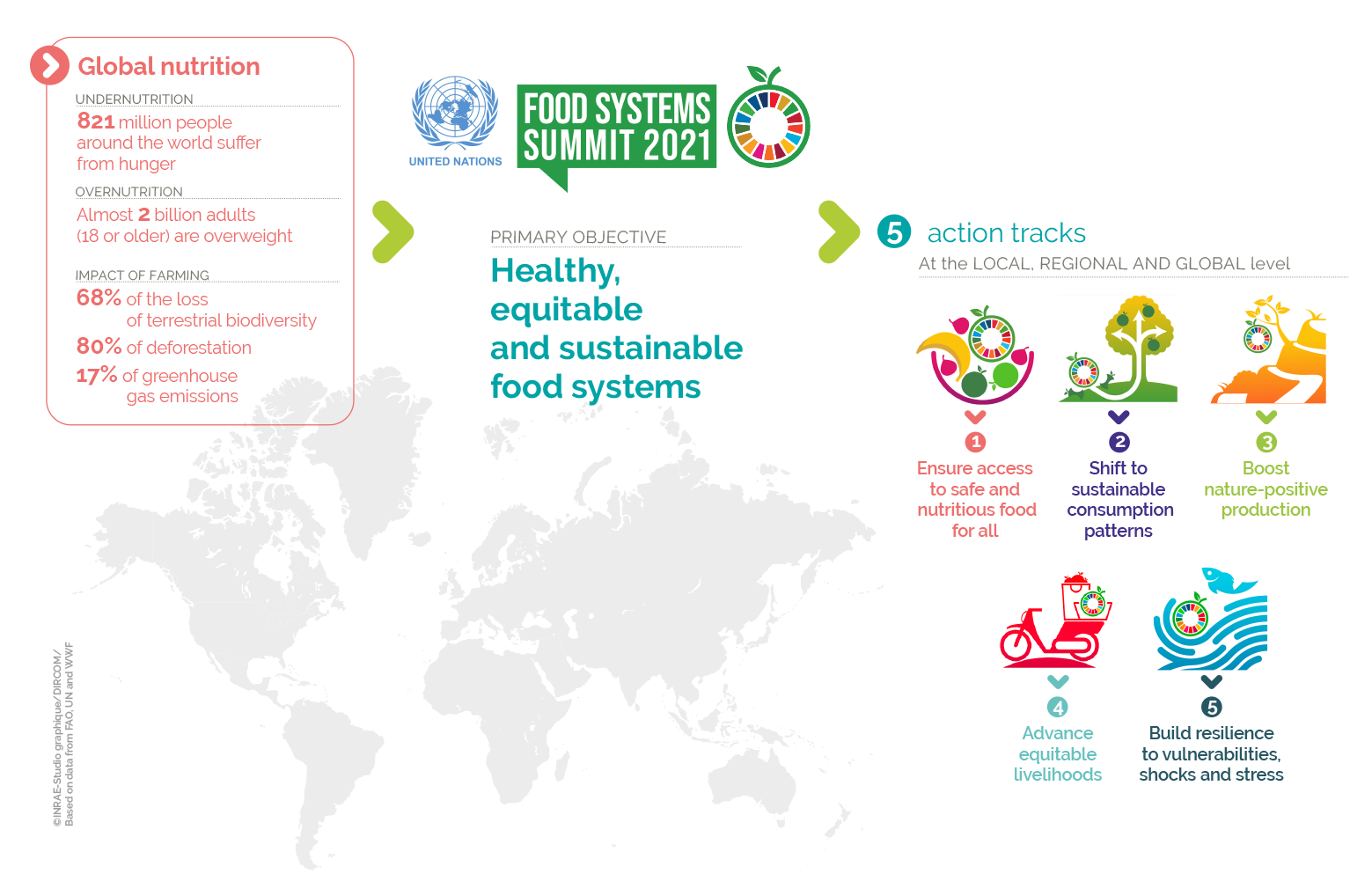INRAE at the UN Food Systems Summit

Looking back at the 2021 UN Food Systems Summit
The UN Food Systems Summit (Food Systems Summit: FSS) aims to raise global awareness and work together to change the way we think about, produce and consume food. It brings together key players from the worlds of science, business and politics, with scientists, farmers, consumers, environmental activists and all key stakeholders. The FSS is a people's summit and a summit of innovative and bold solutions to combat the burden of malnutrition (hunger, micronutrient deficiencies, excess weight and obesity) and to protect the environment and the climate. The first UN Summit on food systems was held in 2021 and saw the launch of a number of coalitions aiming to gather organisations around an integrated, systemic approach at scale to food systems issues. INRAE participates to two coalitions, on agroecology and school meals. Our scientists are involved with its' research and innovation group and our research contribute to several of the Action Tracks defined at the Summit.
Action coalitions
The Summit explored action tracks targets and launched a coalition hub for a number of action coalitions launched during the summit. The priority is to catalyse the achievement of the Sustainable Development Goals (SDGs) by supporting national pathways for food systems transformation by 2030.

Agenda
The 2021 UN Food Systems Summit (FSS) is an ongoing international reflection process, with key milestones:
July 2023
- The UN Food Systems Summit +2 Stocktaking Moment takes place in Rome, Italy from 24 – 26 July 2023, INRAE is part of the French delegation. More info
September 2021
- UN Food Systems Summit in New York and launch of action coalitions
July 2021
- Independent Dialogue on "Strengthening international research cooperation on food systems co-organised by INRAE and UNESP (Brazil) as part of the Science Days programme.
- July 2021: UN Food Systems Summit Science Days, organised by the Scientific Committee and the FAO, with J-F Soussana.
INRAE's research aligned with the action tracks
Science as a foundation for policy and action
The design and implementation of the Summit is supported throughout the process by several bodies including a scientific panel of 29 independent experts. Jean-François Soussana, INRAE's Vice President of international policy is an expert on the panel.
Through monthly meetings held since July 2020, this panel has gathered scientific summary reports and analyses on ongoing initiatives in the framework of, among others, the High Level Panel of Experts (HLPE) of the UN Committee on World Food Security (CFS) and the UN system (the UN and all its programmes, funds and specialised agencies). The Scientific Panel ensures the reliability, representativeness and independence of the scientific data on which the Summit and its products are based. Among the many reports prepared by this panel, Jean-François Soussana (INRAE) and Sheryl Brook (UNESP, Brazil) coordinated the drafting of a background paper (available in English only) to carry out the first Action Track of the summit: The aim is to "ensure access to safe and nutritious food for all through the transformation of food systems".
INRAE's involvement
The goal of "Healthy and sustainable food for all" requires an integrative approach between agriculture-food-environment, which corresponds to INRAE's scientific strategy for 2030. Indeed, sustainability must be designed and applied at every stage of the food chain: a socially, economically and environmentally multi-performing agriculture; the reduction of resource loss and waste; varied, balanced and safe diets; producers who enjoy a decent standard of living; preserved ecosystems, and resistance to climatic and health upheavals. INRAE promotes the need for a transition of agricultural and food systems, combining the principles of agroecology with technical and social innovation such as digital agriculture and biotechnology.
